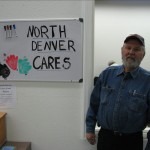
Bryan Decker maintains a 24-foot loading truck, cultivates contacts with local grocery stores and eateries, and manages a pool of 200 workers who distribute more than 1 million pounds of food a year out of a warehouse in Broomfield, Colo. What makes Bryan, 69, unique is that, as director of the North Denver Cares (NDC) food pantry, he does it all for free.
He’s technically “retired” — for 12 years he was a manager for Woolworths, then ran a mechanic shop for School District 14 in Commerce City, Colo., for 20 years — but Bryan still puts in 50-hour-weeks to run NDC. He says his job is easier now, because he’s not running the pantry and working full-time, and thanks to a kidney transplant last February, his wife, Marilyn, no longer needs help with time-consuming home dialysis treatments.
“We just had a passion to do this,” Bryan says, his eyes smiling above his salt-and-pepper beard. “Marilyn retired a year before me, and we prayed and talked about it. Even in the midst of Marilyn’s health problems, we wanted to go ahead.”
For almost 17 years, Bryan and Marilyn have been fixtures at NDC, and its predecessor, which operated out of a Broomfield church’s gymnasium and began by giving out half a dozen bags of groceries a week to needy people.
Catch. Turn. Stack. Turn back. Catch. Turn. Stack. Turn back. Catch. Turn. Stack. Turn back. Bryan’s rhythmic tosses of brown 20-count yogurt containers start blurring together. The higher the stack gets in the walk-in refrigerator, the harder it is to fit them in, Tetris-style. Eventually, it’s two deep and six high. I fumble a box and nearly get clobbered by the next. Bryan chuckles as he pauses to adjust his mesh baseball cap. I can’t help but grin.
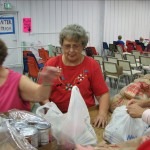
NDC is one of two food pantries in Broomfield, a Denver suburb of more than 53,000 people, but NDC serves people who live in 10 different zip codes in the north Denver metro area. (The other pantry is run by Broomfield FISH, a human service agency, that also offers utility bill and rent payment assistance.)
The bulk of NDC’s 1 million pounds of freely distributed food comes from Community Food Share, a regional food bank based out of Longmont, Colo. NDC also picks up another 80,000-100,000 pounds of food annually from other sources, including about 52,000 loaves of bread from a local Sara Lee, assorted food from four different Safeway grocery stores, and pastries from five local Starbucks and one Panera Bread.
There are 300-400 food banks in the Denver metro area, including 150-200 operated out of churches, as well as county- and federally funded welfare programs, yet like many other pantries, NDC and FISH struggle to meet the local demand for food assistance. After meeting with Community Food Share last spring and using figures from the U.S. Census Bureau, Bryan concluded existing local pantries were meeting 55-60 percent of the need in their counties.
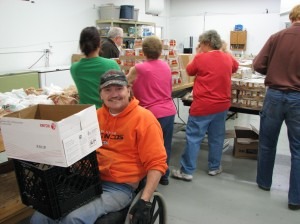
About four years ago, Bryan and his crew were forced to begin limiting their clientele because they didn’t have enough food for everyone and people were coming to them from zip codes on the other side of Denver. They started referring Denver residents to other food banks, and requiring photo ID, proof of residence and income at or below 130 percent of the sliding poverty scale determined by the federal government. Each client’s family can receive up to one load of groceries per week, but if demand continues to increase, Bryan will have to cut clients back to twice a month. Due to seemingly unlimited demand and limited resources, many pantries only distribute food once a month.
Dennis “Wheels” Drieling, a former pool hall manager, says of his time volunteering at NDC, “I’ve really enjoyed it. I’ve really learned a lot.”
Word of mouth brings an average of about 400 families per week with an average family size of 5.6 people to NDC, primarily from low-income areas and mobile home parks in Broomfield, Boulder, Lafayette and Louisville. Bryan says NDC makes more than 100 referrals per month to other community organizations for different types of assistance.
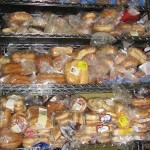
“A lot of people in this country, because of turmoil with immigration, a lot of people have a mindset of built-in prejudice, especially to people in general that are down,” Bryan says in his soft-spoken way, noting that 70-75 percent of NDC’s clientele are Spanish-speakers.
“The people we serve help us, too, probably about 10 percent of them, [which is] 50 or so. They bring their kids sometimes. So we added some classes for kids during the [Thursday food distribution and religious] service. It’s like a Sunday school class…We have two to four bilingual people who do registrations.”
“I think I was prone when I was younger to judge people, and you learn not to do that in this particular ministry. God loves people, and just because they are in dire circumstances right now, I need to help them and not condemn them.”
My fellow volunteers are Dennis, aka “Wheels,” Leon, and Jeremy, aka “Gilligan.” They know the system, and they’re used to orienting new helpers. “You get bread from here, pastries from the other side of this shelf, then you get a bag of canned goods,” Dennis says, a hand on one of NDC’s fleet of shopping carts. He nods from his wheelchair down the line of grocery-laden tables. “You load a container of juice here, four of yogurt, just leave them in the box, grab a handful of bananas, and you’re golden.”
We work in the shadow of tall centrally located shelves stacked with canned goods, neat stacks of empty cardboard boxes waiting to be filled on one side, and several full refrigerators on the other.
I help a volunteer in his twenties fill a line of carts with bread and canned foods, which had been unloaded from palettes and bagged earlier by another team of volunteers. He tells me he’s doing community service for a DWI. “I was stupid,” he says. “But this is cool. I like doing this. I’m happy to do it. I think I’ll even come back [after completing community service].”
“Did you hear about the big guy with the beard?”On the Tuesday after Thanksgiving, a tall, bearded man arrived at the already bustling pantry. He had no proof of residence, because he and his wife had been recently forced to live in their car. He has a job at a local gas station, but his wife has severe vascular problems in her legs. The couple doesn’t have medical insurance.However, the man did have a remarkable story to tell. During a recent shift at work, the tall man struck up a conversation with a customer, and somehow started sharing about his and his wife’s situation. Unaccountably, the customer told him whom he should contact at a local hospital about his wife.I don’t have insurance, said the tall man. I’m a surgeon at the hospital and I will make sure your wife gets the care she needs, said his customer. Gripped by his story, pantry volunteer Lee Elliot made sure the tall man left the pantry with a shopping cart full of food. “It’s a God thing,” Lee said. |
In an effort to help his clients maintain a balanced diet, Bryan coordinates four to five pickups of food per week, including canned goods of beans and rice, fresh fruit and produce when available, and between 300-700 pounds of meat per week.
On Mondays, Bryan gets ready for the high volume days of Tuesday-Thursday. Among other tasks, he prints a current client list, color-coded by day, to ensure each client only receives food once a week. He also keeps handy a list of volunteers from local churches and the community at large, organized by day.
On Tuesday, Bryan drives to Niwot, Colo., where he loads 12-14 palettes from Community Food Share on NDC’s 2006 International box truck with a lift gate, then supervises a crew of volunteers who unload the palettes, bag produce and stack miscellaneous items they manage to get, like detergent. Shopping carts get filled and lined up. At 10, clients get matched with a volunteer and a cart, and the volunteer unloads the groceries into the clients’ vehicle. That goes on until 2 p.m. Later after 9 p.m., Bryan drives to Panera for a pick-up.
Early on Wednesday morning, Bryan has pickups at Safeway and sometimes Sara Lee, then the same routine of food prep and distribution to clients from 10-2.
On Thursday morning, Bryan makes another trip to Community Food Share to pick up six to eight more palettes. Then he returns to the NDC warehouse to oversee the preparations for later in the day. Volunteers begin registering people at 5 p.m.; at 5:15, Victor and Claudio, two local pastors, conduct an optional English and Spanish service; then at 6, the shopping carts start rolling. Typically, 250-300 clients arrive on Thursday nights.
On Fridays, Bryan sends one report to Community Food Share of what food he will need for the next week, and faxes another report to Starbucks.
On Saturdays, Bryan picks up a load of food from two local Safeways, then meets with Victor and Claudio to pray about the next week’s Thursday service.
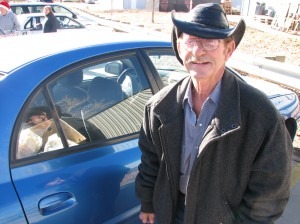
I take my place in the shopping cart line, waiting for the next client to get cleared for groceries. I get matched with a Hispanic woman who looks like she’s in her thirties. “Hi!” I say, pushing the cart onto NDC’s driveway. She smiles shyly at me, and I suspect she doesn’t speak English very well. So I break out my not-very-good, rusty Spanish.
“¡Hola! ¿Cómo está Ud.?”
“Bien, gracias,” ella dice.
“¿De dónde es Ud.?”
“Ciudad Juarez.”
“¿Sí? Viví en Las Cruces, Nuevo Mexico, para cuatro años. Que fuerte que pasa en Juarez ahora mismo…”
We talked about about the sad reality of drug cartels shooting kids at birthday parties in her hometown just across the U.S. border. I loaded the groceries for her and her family in the back of her van, and we said goodbye. “¡Que vaya bien!”
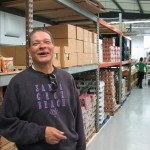
NDC’s only expenses involve fueling and maintaining their trucks, and paying rent for their warehouse. Bryan is in the process of applying for grants and otherwise attempting to raise money to pay rent for year two at the warehouse, which is a welcome challenge, because when the church that originally started the pantry decided to close it, Bryan and Marilyn felt called to keep it going.
To their relief, Bryan met the leadership of Crossroads Church, a local, multi-site faith community whose motto is “serving people toward Jesus,” and a new partnership for running the pantry was born. This fall, Bryan received non-profit status for NDC, and he envisions big things for the future, including expanding the pantry’s hours, opening a thrift store to help support the pantry and complement the Habitat for Humanity Thrift Store next door, and starting a job center for training new tradesmen, plumbers and electricians.
“[Radio preacher] J. Vernon McGee used to make the statement that ‘One thing I want to do in my life is to finish strong,’” Brian recalls. “I want to finish strong. We raised five kids, I worked two jobs to support them, and we lost a sixth, Cindy, a little girl who died when she was three months, twenty days…It was called ‘crib death’ at that time. We have 13 grandkids, six great-grandkids…[but] I can’t just dry up and quit. That’s why we work at this.”
To find food pantries in your area, check out Feeding America or talk to the leadership of your faith community. For more information about volunteering or donating to NDC, contact Bryan.


